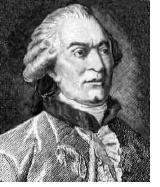 George Leclerc was born into a wealthy family. When he was ten years old his mother came into a large inheritance and his father became lord of Buffon and Montbard and counsellor in the parliament of Burgundy.
George Leclerc was born into a wealthy family. When he was ten years old his mother came into a large inheritance and his father became lord of Buffon and Montbard and counsellor in the parliament of Burgundy.Naturalist; b. 7 September 1707 (Montbard, France), d. 16 April 1788 (Paris).
 George Leclerc was born into a wealthy family. When he was ten years old his mother came into a large inheritance and his father became lord of Buffon and Montbard and counsellor in the parliament of Burgundy.
George Leclerc was born into a wealthy family. When he was ten years old his mother came into a large inheritance and his father became lord of Buffon and Montbard and counsellor in the parliament of Burgundy.
George received his education at the Jesuit College of Godrans in Dijon and in 1723 on his father's wishes moved on to study law. He showed no great interest or gift for it and in 1728 want to Angers to study mathematics, medicine and botany. As a student he led the life of a rich son from a wealthy family. In 1730 he had to abandon his studies and flee Angers after a duel. For two years he travelled through southern France, England and Italy. When his mother died in 1732 he decided to return to his family estate and take over its management.
Life on his property enabled Buffon to follow his various intellectual interests. He began research into the calculus of probability and translated various works, among them Newton's Fluxions, to which he added a comparative discussion of the infinitesimal calculus according to Newton and Leibnitz. His Mémoire sur le jeu de franc-carreau (Memoir on the game of Franc-Carreau [a game of chance in which two coins fall on a tiled floor and the bet is whether they fall on a crack]) introduced differential and integral calculus into probability theory and brought him the election to the Académies des Sciences in 1734.
In 1739 Buffon was appointed keeper of the Royal Botanical Garden. He now spent eight months of the year at his estate and four months in Paris. During the next five decades he managed to double the size of the Botanical Garden, enlarged its collections and improved its buildings, while at the same time expanding his own estate and increasing his wealth considerably.
Buffon's aim in life was to produce an encyclopaedia of 50 volumes called Histoire naturelle, générale et particulière. Only 36 volumes had appeared by the time of his death, and they covered such diverse matters as geology, biology, mathematics, chemistry, optics, astronomy, philosophy and much more. Not being properly trained in most of these sciences, Buffon harvested snubs and criticism from all quarters. But he did receive recognition as an independent thinker who insisted that all natural phenomena have natural causes. (He criticised Newton for the notion that the Sun and the planets were initially God's creation and developed his own theory how the planets were the result of meteorite collisions with the Sun.)
Public recognition helped Buffon to endure personal hardship. He had married late in life (at the age of 45). His wife died in 1771. Their only son developed into a playboy who squandered his inheritance. During the French Revolution he ended up on the guillotine, a fate his father did not have to witness any more.
O'Connor, J. J. and E. F. Robertson, Georges Buffon.
http://www-gap.dcs.st-and.ac.uk/~history/Mathematicians/Buffon.html (accessed 23 September 2004).
Piveteau, J. (1995) George-Louis Leclerc, compte de Buffon. Encyclopaedia Britannica 15th ed.